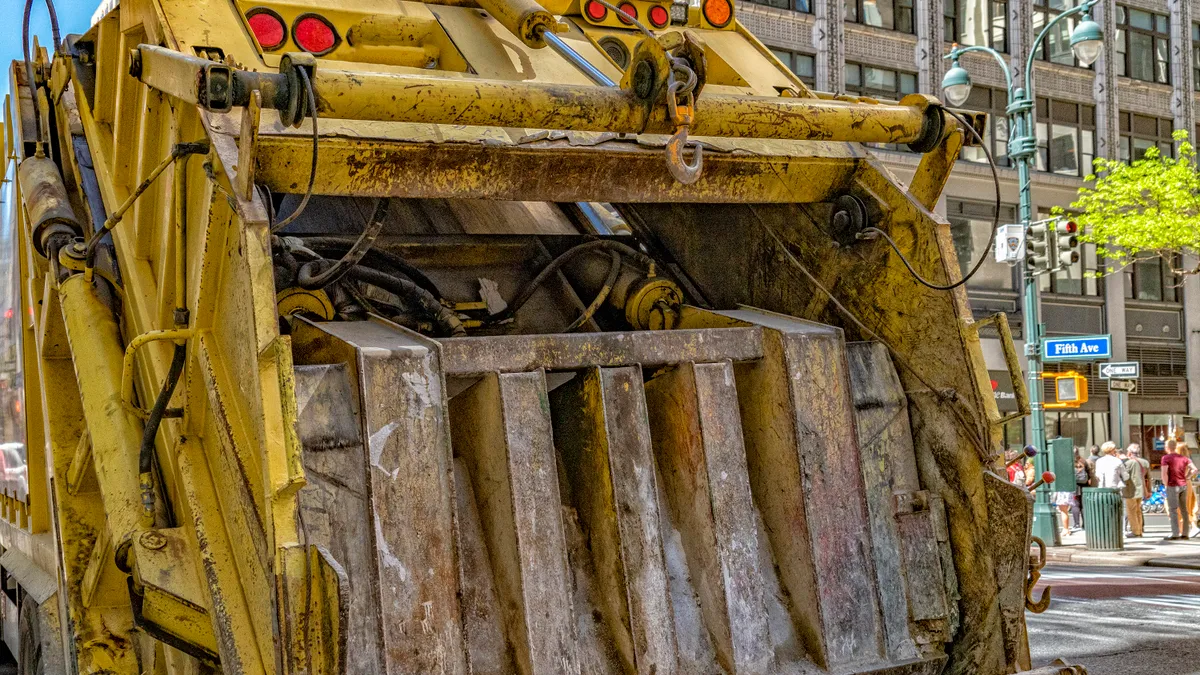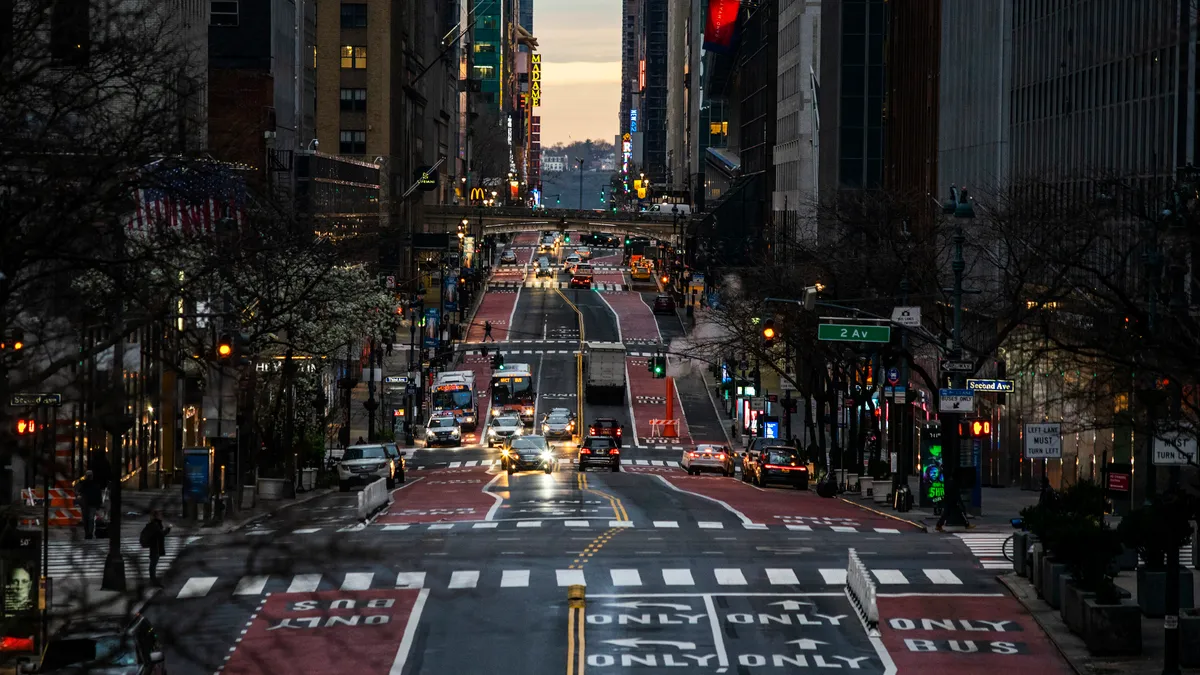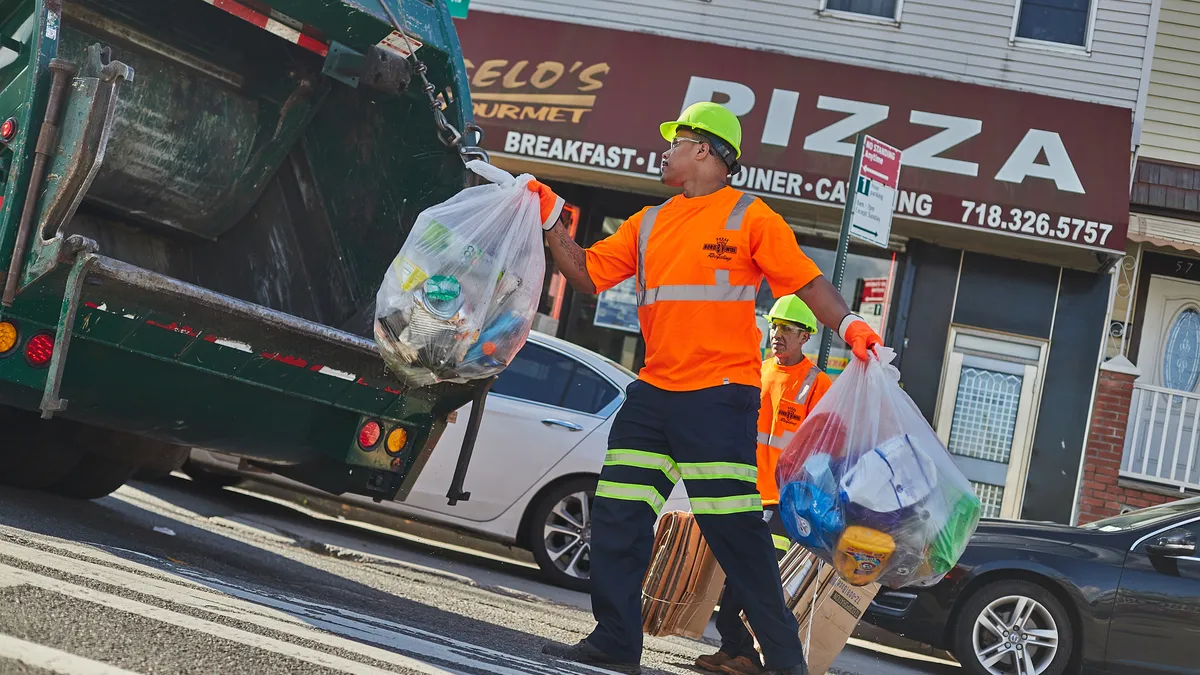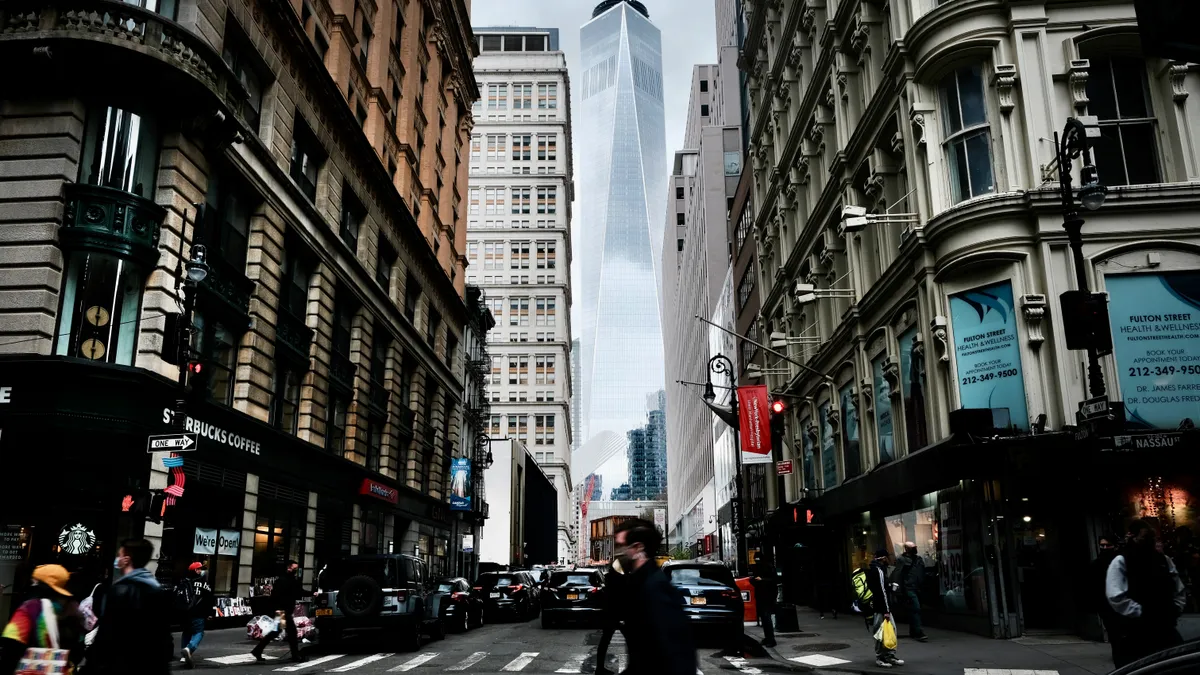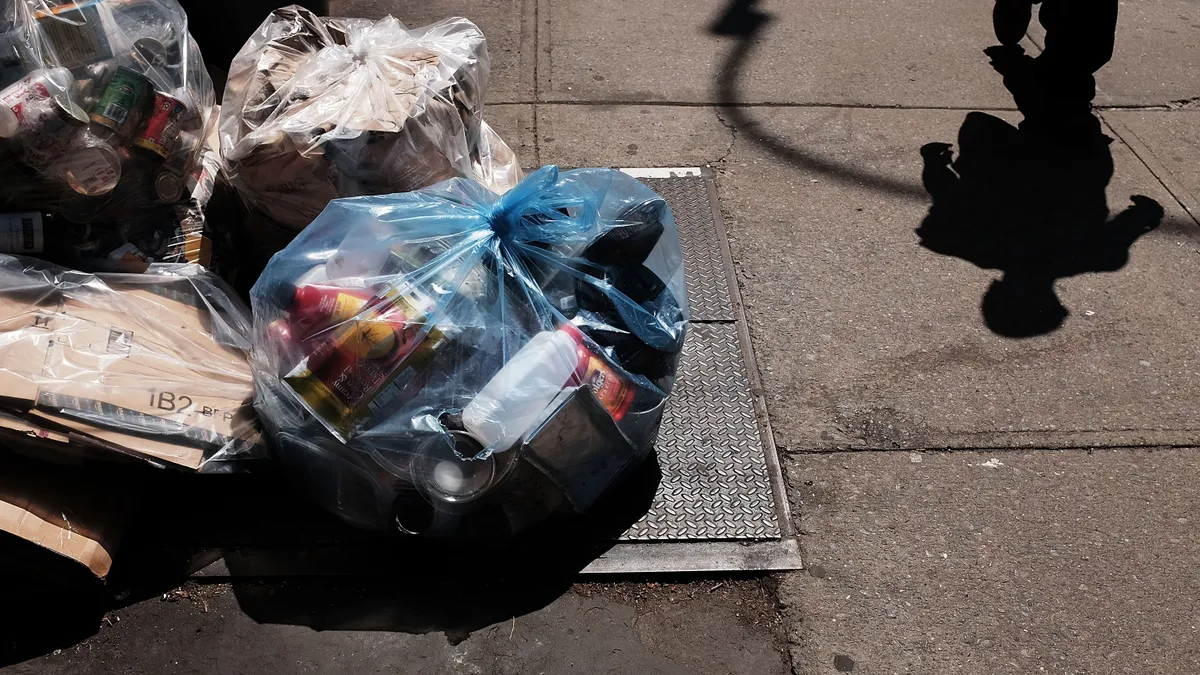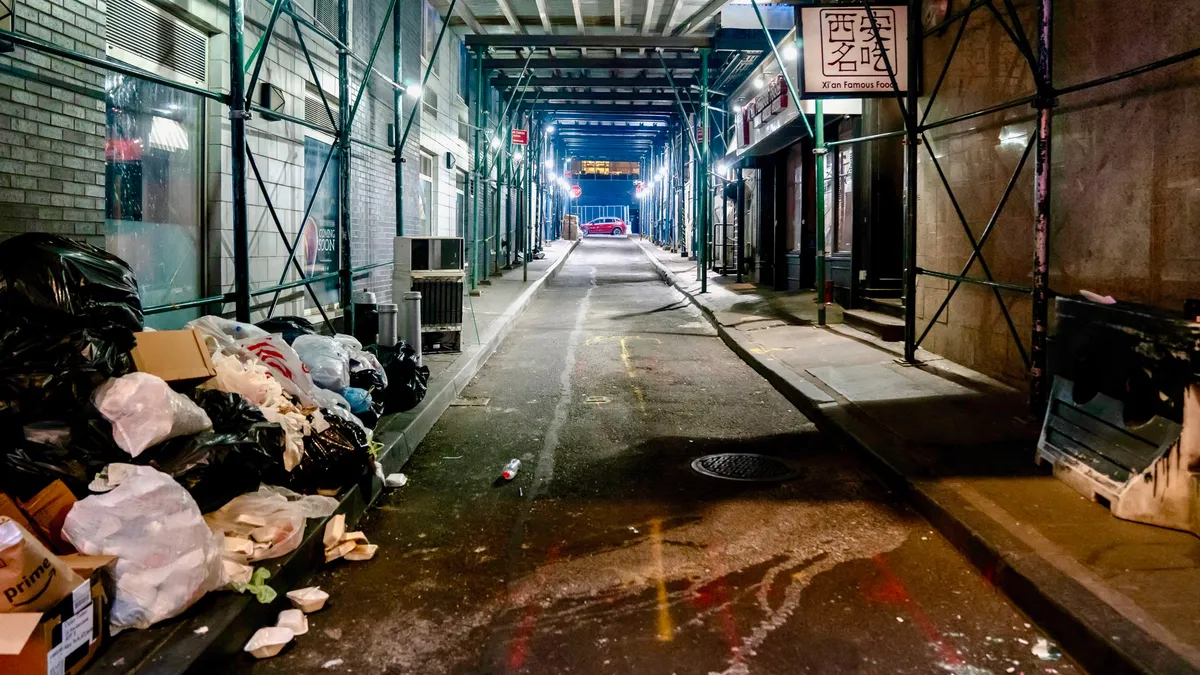New York’s commercial waste market — the largest in the country — was fully privatized more than 60 years ago, but it has always resisted serious consolidation. Now, depending on how a franchise zone bill proceeds, the market could be on the verge of a historic shakeup.
After five-plus years of planning, lobbying and highly charged campaigning, details of the legislation required to establish the zones remain in flux. Geographic exclusivity is the key sticking point, but a deal between Mayor Bill de Blasio's administration and sponsors in the New York City Council is said to be imminent. The decisive vote could occur as soon as this month.
The exclusive option has raised concerns about industry giants dominating market share at the expense of competitors and customers. Supporters believe this exaggerates the case, pointing to numerous benefits from a more organized system, and say a non-exclusive system wouldn’t go far enough. Others view non-exclusive as a viable middle ground, while a shrinking group of opponents to either approach continue to call for making reforms within the current regulatory framework.
If any version of this bill passes, the open market system responsible for collecting an estimated 3 million tons of waste and recyclables per year could be transformed dramatically. As more commonly seen in Western states, companies would have to meet certain requirements in order to win long-term contracts for servicing a set number of zones.
Given the sheer scale of what’s being proposed, the emotional weight of this debate can often overshadow the market implications. Multiple workers and members of the public have died, including just last month, as a result of industry-related crashes. Fleet emissions and recycling progress are still not at levels that match the New York City Council's urgency to meet its recently declared climate emergency. Some of the smallest companies, possibly ones with decades of family history in the city, may not survive if a zone system passes.
That sense of existential change was palpable at a packed June sanitation committee hearing on the bill (Intro. 1574). Early in the five-plus-hour proceeding, Council Member Antonio Reynoso recognized the situation's gravity but didn't shy away from confrontation.
"We’re not trying to go after these carting companies that are doing the right thing. We want them to continue to do work in the city of New York. They are meeting a standard that we believe is a New York standard. But there are a lot of businesses that are not," said Reynoso, the bill's sponsor, drawing applause from supporters in the chamber. "If you’re killing people, if you’re not paying people a fair wage, if your trucks are destroying the environment, destroying our streets, I don’t want you to do business in the city of New York."
The question of which companies will get to do business in New York under a franchise system, and who stands to gain in the process to create one, is one that Waste Dive has been exploring in the months since.
The competitive landscape
New York's five boroughs have long been considered too complicated, too expensive and (at one time) too corrupt for national players to dominate like they have in many other urban markets.
According to the Department of Sanitation (DSNY), around 90 companies are licensed to operate in New York and service an estimated 100,000 customers. The number of companies with notable business is often up for debate, but a city analysis indicates the majority are small operators and about 20 currently control 80% of the market share. As of 2015, the portion of this market that would be affected by zoning (certain categories are exempted) was worth $455 million in annual revenue.
Opinions vary, but the consensus among sources is that an exclusive system could cut the field to less than a dozen players. Non-exclusive zones could potentially sustain closer to two dozen, effectively the universe of sizable operators in the city now.
While anecdotes about dozens of different companies' trucks buzzing around during the night have become emblematic of a situation that DSNY describes as "unsafe, unfair and unsustainable," the agency has repeatedly stated its goal is not to put companies out of business.
"We don’t think the number of companies is an inherently bad thing," said DSNY Director of Commercial Waste Zoning Justin Bland at the June hearing. "We want the best companies to get contracts, not just the biggest. It has to be the best."
DSNY envisions a non-exclusive system, with three to five companies operating in each zone depending on size (for a total of 68 contracts) in the name of maintaining competitive pricing. Reynoso's bill, with backing from the Transform Don't Trash coalition (including the Teamsters and many environmental groups) would support just one company per zone in the name of greater vehicle emissions reduction. Each plan currently calls for a total of 20 zones, with no company allowed to operate in more than 15. Initial contracts are expected to run for 10 years, with options to extend.
While the National Waste & Recycling Association's (NWRA) local chapter favors maintaining the open market system, the city’s two biggest players have gone in a different direction.
Waste Connections, the local industry's second-largest player, has been the biggest booster when it comes to the exclusive model.
"Waste Connections wholeheartedly supports the city, this committee and Chairman Reynoso's efforts to reform the commercial waste and recycling industry. If the city is going to choose a franchise model, Waste Connections supports the exclusive zone model," said Andy Moss, government affairs manager at the June hearing. "We fear a non-exclusive system would look too much like the present system we have now."
Last year, then-CEO Ron Mittelstaedt told Waste Dive this was a key reason for the publicly traded giant to stay in the market after entering via acquisition in 2016.
Action Environmental Group – the city's largest hauler – has been supportive, though with less enthusiasm.
"We have been advocating improving standards for a long time. We’re not completely convinced that the only way to do that is through zoning," said CEO Ron Bergamini at the hearing. "However, if we’re going to go with that option we believe the single hauler is the better option."
The most high-profile skeptic of this exclusive approach has been DSNY Commissioner Kathryn Garcia. While she couldn't attend the hearing, Garcia outlined her stance in an August interview.
"I am extraordinarily wary of exclusive zones, because those are essentially monopolies," she told Waste Dive. "It will be very, very large companies then that take over this industry. We want to make sure that the folks who have been working here have a shot, that it's at least somewhat of a level playing field. But more than that, I just feel that if you have a monopoly situation that we will get the worst of all worlds."
Anxiety from other existing players about potential consolidation was a running theme at the June hearing, and in the months since.
"Financially speaking, the bill under consideration most benefits the two largest haulers in New York City," testified Recycle Track Systems CEO Greg Lettieri, whose company could be limited under zoning due to its classification as a broker. "Under the proposed system, they would be quite excited to win exclusive zones. However, I believe [they're] not capable of actually handling the task."
Filco Carting COO Domenic Monopoli, speaking about Waste Connections specifically, recently told Waste Dive, "It’s a well-run company. It’s a big, beautiful public company, but I get work from them every day."
He likened outside nationals that might bid on franchise zones to "barbarians at the gate," and believes they likely will scoop up market share, but maintains "service is going to suffer dramatically." Managing a route on the streets of New York, in Monopoli's view, is "like threading a needle every night" and a skill not easily acquired.
Stephen Leone, president of the smaller Industrial Carting, testified about how he believes franchising would create a "static environment" – as compared to now where "I routinely compete with and succeed against competitors that are five, 10, 20 and 50 times my size."
Adam Mitchell, head of the sales team at Mr. T Carting, called the plan "a wolf in sheep’s clothing." Mitchell later told Waste Dive he believed Reynoso's plan would "expedite the evolution of late-stage capitalism" and said the company’s biggest concern was that "there's no interest in talking about decent locally owned business having a set aside so they can ensure they continue to have a place in the market."
When Los Angeles launched its own franchise system in 2017, certain zones were designed with the intention of supporting smaller companies. That idea hasn't gained as much traction in New York, in part because DSNY sees its non-exclusive model as a natural way for smaller companies to coexist.
Asked whether she thought outside companies might still bid under DSNY's version, Garcia reiterated a position she's been taking since the agency switched its preference to a non-exclusive system last year.
"I think that it is much less likely," said the commissioner. "If they control a whole market, they are likely to do better than if they have to continuously compete for customers, who I think will keep them all on their toes."
Despite DSNY's pledged support for smaller haulers, some of zoning’s most ardent opponents aren't convinced. New Yorkers for Responsible Waste Management (NYRWM), a trade group formed in large part to fight this plan, continues to advocate for a 2018 bill (Intro. 996) that would maintain the open market system with some changes.
"DSNY’s rhetoric about wanting to preserve opportunity for good small- and medium-sized companies is not yet matched by any aspect of their plan," Executive Director Kendall Christiansen told Waste Dive in August. “We continue to believe that all of the city’s goals, including more efficient routing, can be accomplished more quickly without a complex zone system."
According to Christiansen, truck traffic could decline even sooner without an overhaul because "the industry is poised for rapid consolidation if the threat of franchising was lifted." Conversely, many believe the passage of a franchise bill would likely herald consolidation too.
If that comes to pass, especially in an exclusive system, large companies may have a better chance to rise up in the New York market than they have in years. Zone supporters maintain they’re agnostic to who wins contracts as long as they can raise the bar from what has come before.
Narrowing the field in 2020
Regardless of whether commercial waste zoning moves to the RFP stage next year, as DSNY's timeline indicates it would, 2020 is already expected to be an inflection point for industry consolidation.
As of January 2020, all local waste fleets will have to meet or exceed new emissions standards that come with a cost. A running complaint in recent years has been that the specter of franchising makes it hard for smaller companies to move ahead on such investments if they could soon be out of business.
While many of New York’s largest operators report they’ll be ready, and a records request to the city’s Business Integrity Commission indicates only seven temporary exemption waivers have been submitted by licensees, sources with direct knowledge of the acquisition landscape believe many small companies are holding out in hopes of selling their business.
Local acquisition activity has indeed been stagnant compared to national trends. Action completed a couple of small deals last year. Waste Connections has too, including the purchase of a prime transfer station asset in the South Bronx earlier this year. One small company, Quality Waste, was bought by another, Metropolitan Waste.
This whole dynamic could be jolted by franchising of any type, perhaps even more so if new players choose to pursue contracts. While new entrants are still seen as more interested in an exclusive zone system, the rarity of local RFP process might be enough for them to at least test the waters.
“When you create a new process like this it creates an opportunity where common business sense says that everyone's going to take a look," said Steve Changaris, vice president of NWRA's Northeast region. "Most of those taking a hard look, if they like what they see, they’re going to put in a good faith request to participate."
Given the administrative burden of submitting a complex RFP, and the fact that long-term franchise contracts are an important pillar of their business models, large national or regional companies are perhaps the most well-equipped to do so.
"The national companies are certainly watching the evolving commercial waste zone situation in New York City with some interest and it’s certainly possible that one or more of them may bid on zones if the city council passes a commercial zone bill," SWANA CEO David Biderman told Waste Dive over the summer. Though more recently, as signs began pointing toward a non-exclusive compromise, Biderman said "it's unlikely that a large number of companies not currently in the market would bid."
The list of prospective new bidders could include a range of players that currently have infrastructure in the greater metropolitan region. The city has also left the possibility open for existing companies to bid together via consortiums.
Among possible entrants, the biggest of them all has given clear signs it’s following the process.
Last year, Waste Management CEO Jim Fish told Waste Dive the company hadn't ruled anything out. This May, COO John Morris told investors the company was watching closely and cited the company's successful growth from the Los Angeles franchise conversion. Waste Management's most recent lobbying disclosure also cites Intro. 1574 as a topic of interest.
Asked about a potential bid, and whether it had any preference for exclusive or non-exclusive zones, the company offered a brief reply.
"We are maintaining our neutral position on the commercial waste zone bill and are keeping all of our options open," said Communications Manager John Hambrose via email.
Deciding factors
While many are curious about how the market will shake out, the bill is far from a done deal and many elements remain in flux. Beyond health and safety plan requirements — a topic which companies, associations and unions have plenty of opinions about — two of the most commonly discussed themes are pricing and infrastructure.
Preserving customer choice and price competition have been cited as among the main reasons the city decided to back non-exclusive zones. DSNY has long maintained pricing won't have to rise under its proposal, despite the onset of new service requirements. The agency points to an expected 2% reduction in operating expenses, driven by more efficient routes and potentially lower labor costs, as the way this could all even out.
There was some equivocation on this point from officials during the June hearing, as actual bids may vary, but Garcia largely stuck to the initial assessment.
"There's no reason it should spike, unless there's a monopoly where I do think there's more likelihood of that," the commissioner told Waste Dive, noting that might happen if current prices are artificially low because "the carter that customer is currently using is doing things that are currently not legally allowed."
In an effort to avoid bids coming in high as a way to manage risk, Garcia did say there could be options for some type of consumer price index escalation in bids, separate pricing structures for higher service levels and a mechanism to recognize commodity price fluctuations.
Powerful forces now backing non-exclusive zones over similar competitive considerations include the Real Estate Board of New York (REBNY), which fears its large commercial members could get stuck with inadequate service under an exclusive system. While REBNY still has concerns about the disruption of existing relationships between larger customers and chosen providers across multiple zones, especially for roll-off containers that only require one round trip, the group has largely come around to DSNY's position.
"Our members want safer, greener streets and they also want the ability to choose from a competitive selection of vendors to ensure they continue to receive a high level of service. We’re hopeful the Council will enact an approach that strikes a thoughtful balance between those important priorities," said Zach Steinberg, REBNY's vice president of policy, in a statement.
Yet the notion of keeping prices low runs counter to both current national industry trends and what some local companies say are the unavoidable realities of higher service standards.
"Over the long term I suspect the prices will go up, particularly because there will be more requirements – most of which will be good requirements," Action CEO Ron Bergamini told Waste Dive over the summer, citing areas such as safety and recycling.
Bergamini wasn't necessarily convinced operational savings would be enough to offset new service requirements, in part because his company's nightly routes are already almost half as long as the 100-plus-mile ones often cited as examples of inefficiencies.
"I'd rather see people compete on service than price," said Bergamini, noting he feels the exclusive plan would make that easier. "You can be more creative if you had the whole zone."
That undefinable element of creativity will play an important role in a potential RFP process, as neither DSNY's or Reynoso's plan set much in the way of specific infrastructure requirements. Unlike the Los Angeles system, which even went so far as to mandate facility upgrades, New York's process is expected to be more open-ended. The hope is companies will pitch offerings such as newer trucks, expanded organics processing capacity or perhaps even new MRFs to make their bids more competitive.
Supporters see these as critical elements for safety and recycling progress, but ones that may be harder to scale in a non-exclusive model. The thinking from various sources, including companies and Transform Don't Trash (TDT) advocates alike, is competitors sharing a zone could undercut each other on price by making more limited investments in these areas. Some think even if competitors are on a level playing field it may be hard to get customers to go along with more sustainable offerings without adequate city enforcement.
Alternately, backers of exclusive zones believe their version would provide more certainty — especially in the eyes of investors — and possibly even help keep savvy smaller companies in the mix.
"They will be given a 10-year contract which they can take directly to the bank, which will allow them to make the investments they need to grow," said Melissa Iachan, a senior staff attorney at TDT member New York Lawyers for the Public Interest. "This is not necessarily a bad thing for smaller companies. It’s actually an opportunity."
When asked about this financing question, Garcia said she hadn't heard it raised directly and noted a nonexclusive system would still provide more financial certainty than the current two-year contract maximum.
Other ideas have also been raised about alternative ways to address concerns outside of the currently proposed framework. Some say a capital recovery surcharge mechanism could help fund infrastructure, or that some zones should be exclusive and others not, or perhaps each of the five boroughs should be a zone itself.
Some of the most detailed ideas so far have come from the Center for Zero Waste Design, represented by Benjamin Miller at June's council hearing.
As laid out in testimony, as well as Miller's recent article, the current framework could potentially be reshaped in a way to meet the goals of many stakeholders. Zone boundaries could be more fluid to fit local needs, alternate collection methods could be incentivized to minimize truck traffic, an escrow fund could be established to support recycling innovation and plenty else. To accomplish these goals Miller does believe an exclusive model is the wisest choice, but said options abound to maintain competition.
"In my view it’d be highly desirable to keep as many highly qualified companies in town as possible," said Miller. "Conversely, accelerating the agglomeration of companies so that we have fewer, larger companies is not a good thing. There are lots of ways to write the bill in a way that would encourage a larger number of players as opposed to the way it’s written now."
Down to the wire
Working out all of these details for what could arguably be one of the biggest shifts in the history of New York's modern commercial waste industry was always going to be a major undertaking. The fact that DSNY and Reynoso entered the final stretch of a multi-year discussion with parallel proposals has made for a more complicated legislative process than expected.
Reynoso's bill has now racked up 25 sponsors (including Council Speaker Corey Johnson and Public Advocate Jumaane Williams) but there has been no activity in terms of amendments or a scheduled committee vote in the months since its initial hearing. The council member’s office said he’s no longer commenting on the bill during negotiations, after September stories by Crain’s New York Business and The Wall Street Journal fueled speculation a deal could be coming soon.
Back in June, talking to Waste Dive after the lengthy committee hearing, Reynoso outlined his plans for a deliberate approach.
"I want to be very clear that I don't think I'm at odds with DSNY," he said. "Long-term, 20 years from now, when I look back on this industry that reformed I want it to be working. It's part of my legacy. I am not rushing this."
Speaking to Waste Dive again in August, the council member reiterated his desire to collaborate with the de Blasio administration and promised a deal would be reached. He emphasized that achieving the best environmental outcome was a top priority for both him and his supporters in the TDT coalition, while recognizing "that doesn’t mean we need to keep it exclusive."
This potential shift to non-exclusive is considered increasingly likely, though not necessarily welcome by all involved. Action's Bergamini recently confirmed his preference remains for exclusive zones, as did his publicly traded competitor.
"Exclusive and non-exclusive can both work," wrote Jason Craft, regional vice president for Waste Connections, via email. "The devil is in the details on the requirements and restrictions that are placed in the bill."
Asked for the latest on its position, Mr. T reiterated a version of President Tom Toscano’s May quote to Waste Dive ("Exclusive is like being hit in the head with a bat and non-exclusive is like being punched in the stomach") about which option might be more preferable.
As the process nears its seeming conclusion, other companies are keeping their opinions more guarded. In the case of those affiliated with NYRWM, some are also still hoping the whole discussion may fall apart.
"We’re now entering the period where deal-making to get something done, however irrational or potentially damaging to the city’s overall interest, is the imperative, and moving numbers around on a map is the game," said Christiansen in a recent statement. "Monopoly zones may be dead, but DSNY’s ‘plan’ remains an untested, unprecedented idea with a host of unanswered questions – including the fate of dozens of local companies and thousands of workers."
With rumors swirling about a deal coming at any time, groups on various sides of the issue are still pushing their preferred versions of how to reshape the market. TDT and its allies recently sent out a letter backing Reynoso's original bill with new support from high-profile environmental groups such as the Sunrise Movement and 350.org. Meanwhile, nearly 30 large business groups (including REBNY) recently sent out their own letter backing DSNY's non-exclusive plan. Multiple companies are also continuing their own lobbying efforts in a more quiet fashion.
What exactly the next version of this legislation looks like, or whether it can pass, will be known in a matter of weeks. If a bill does pass — with a similar framework to what has been discussed — the environmental, social and logistical changes in store will be striking and historic.
While it would still take years to see if such a system actually works as intended, and whether it has any unforeseen consequences, it may become clear much sooner just how effective a zoning system can be in reshaping the New York commercial waste market's competitive landscape.







